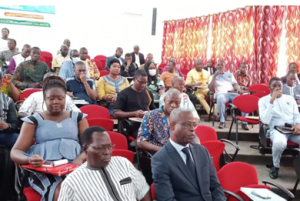Burkina Faso – SUSTAINABLE PUBLIC PROCUREMENT The national sustainable procurement strategy is being disseminated.
Burkina Faso’s Public Procurement Regulatory Authority (Arcop) has drawn up a national sustainable procurement strategy, together with an action plan and implementation tools. This was made possible thanks to funding from the World Bank’s Economic Governance and Citizen Participation Project (PGEPC). On 1 April 2022 in Ouagadougou, a workshop to disseminate this strategy was organized for public procurement stakeholders. The aim was to enable them to familiarize themselves with the content of these documents, with a view to the successful implementation of sustainable procurement in the country.
In the search for new sustainable management policies, countries are increasingly taking account of environmental, social and economic issues. These (issues) are linked, in particular, to global
warming, the fight against poverty and the promotion of the green economy. It is against this backdrop that ARCOP (the French public procurement regulatory authority) has drawn up a national sustainable procurement strategy, with an action plan and implementation tools. This was made possible thanks to funding from the World Bank’s Economic Governance and Citizen Participation Project (PGEPC). On 1 April 2022 in Ouagadougou, a workshop to disseminate this strategy was organized for public procurement stakeholders. The aim was to enable them to familiarize themselves with the content of these documents, with a view to the successful implementation of sustainable procurement in the country.
What is sustainable public purchasing (SPP)?
 Sustainable Public Procurement (SPP) or responsible purchasing is a major lever for sustainable development throughout the world, in terms of both social progress and rational, environmentally
Sustainable Public Procurement (SPP) or responsible purchasing is a major lever for sustainable development throughout the world, in terms of both social progress and rational, environmentally
friendly economic growth. According to Tahirou Sanou, Permanent Secretary (SP) of the French Public Procurement Regulatory Authority (ARCOP), ODA is understood, within public procurement contracts and delegations of public procurement contracts, as any form of acquisition of goods and services in which public purchasers (the public administration) must consider sustainable development obligations. These include social, environmental and economic considerations. This must be done in compliance with the principles of good governance, efficiency and the proper use of public funds.
The national sustainable procurement strategy to improve the sustainability of acquisitions.
Sustainable procurement is not consistently taken into account in public procurement operations in the sub-region or at national level. With a view to improving the sustainability of procurement,
ARCOP received support from the World Bank in the form of a consultant who worked on the issue. The consultant developed a national strategy for sustainable procurement, together with an action plan and implementation tools. The general objective of this strategy is to support the development and implementation of a coherent, appropriate national sustainable procurement
policy capable of acting as a lever for the systematic integration of sustainable development considerations into public procurement.
According to Tahirou Sanou, SP of ARCOP, to achieve this objective, the strategy has set out a number of priorities. It also includes an action plan. That’s why this workshop is being held. “Today, the aim is to discuss the content of the guidelines and action plan with all the key players in public procurement, so that everyone is at the same level of information about sustainable procurement requirements”, he explained. The 6 strategic axes are, in particular, information and awareness-raising, capacity-building for contracting authorities and the private sector, the legal and institutional framework, the design and launch of a pilot phase, the setting of general objectives to be achieved in terms of ODA and the promotion of good governance in ODA. The overall cost
of the activities, covering a 4-year planning horizon, amounts to 939,000,000 FCFA.
Issouf TAPSOBA (Contributor)




